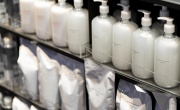EU set for circular economy talks after Council reaches agreement
The first Circular Economy Package trilogue negotiation between the European Council, Parliament and Commission will take place next week (30 May), after the Council agreed a negotiating mandate on Friday.
The Council’s Permanent Representatives Committee (Coreper) agreed its negotiating mandate on Friday afternoon (19 May), following discussions on the package’s four legislative proposals across three council presidency periods.
Though it has not made details of its negotiation stance public Resource understands that it is seeking to reduce the 2030 target for reuse and recycling to 60 per cent, as well as reviews on individual targets for textile waste and clarifications on the definitions of recycling and municipal waste, with the provision of a common methodology to report the reuse of products by 2019.
A report from a group of NGOs led by the European Environmental Bureau (EEB) last week revealed which member states were actively campaigning against the increased measures on resource efficiency, with the UK refusing to reveal its stance, drawing the ire of the group for its lack of transparency.
The EEB stated: ‘Recent leaks of the Council’s current common position show that the laggards are winning out, despite higher individual ambition by some member states in areas including recycling targets, extended producer responsibility and biowaste separate collection.’
The Commission’s proposed Circular Economy Package, released in December 2015, included four legislative proposals to six pieces of waste legislation (Waste framework directive, Packaging waste directive, Landfill directive, Directive on electrical and electronic waste, on end-of-life vehicles; and on batteries and accumulators and waste batteries and accumulators), introducing additional measures to reduce waste generation, control waste management, boost recycling and cut resource use.
The European Council says that negotiations are expected to focus on a number of outstanding elements, including the definitions, the setting of binding targets and their calculation rules, end-of-waste criteria, extended producer responsibility schemes and waste prevention.
Negotiations begin
The development of the Circular Economy Package was delayed for a year while the European Commission created a ‘more ambitious’ framework, which eventually consisted of a 65 per cent target for recycling across all member states and measures on landfill reduction and the recovery of packaging waste.
Despite the delay, however, the European Parliament, which agreed its negotiating position in March, has sought to increase the scope of a number of proposals, raising the recycling target to 70 per cent by 2020 and adding measures to require at least five per cent to be prepared for reuse, with other proposals to oblige the separate collection of biowaste and textiles and investigate a food waste target.
The trilogues taking place next Tuesday will be the first meeting between the three institutions, as they seek to find agreement on the legislative amendments.
With each seemingly taking different views on a number of measures, particularly the headline recycling target, ranging from 60 per cent (Council) to 70 per cent (Parliament), it remains to be seen how smooth the discussions go.
When MEPs voted to take on amendments raising the ambition of the targets, First Vice-President of the European Commission Frans Timmermans welcomed the outcome, tweeting: ‘Thanks to MEPs for this inspiring #circulareconomy debate. The longer we wait and the less ambitious we are, the higher the cost to Europe’ – suggesting that the Commission may be open to raising its targets.
Given the speed of the arrangement of the meeting following the Council’s mandate being signed off, it is almost certain that any legislative changes will be made before the Brexit process is completed, meaning, as Resources Minister Therese Coffey has previously acknowledged, the UK will take on any measures enacted, at least in the short term. 









